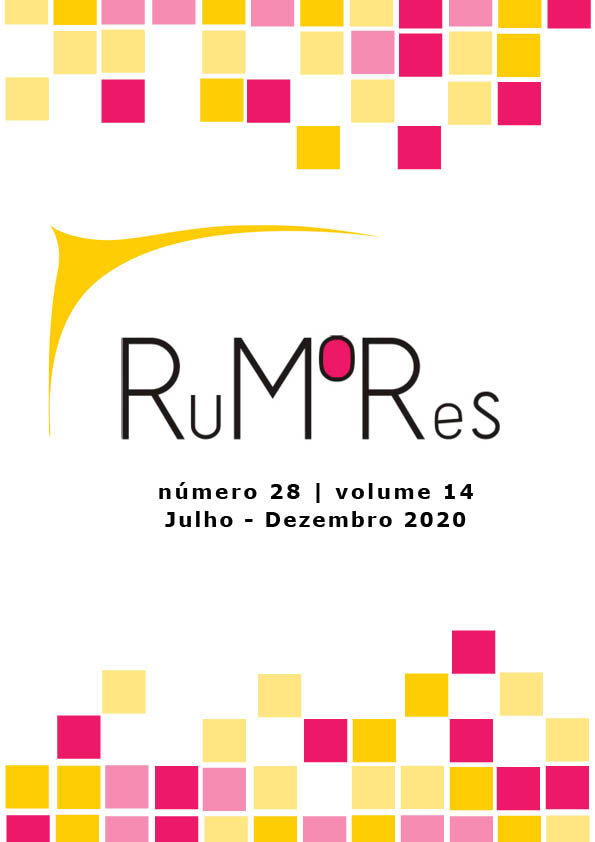Worldbuilding in TV fiction and the issue of realism: the case of The Wire
DOI:
https://doi.org/10.11606/issn.1982-677X.rum.2020.174429Keywords:
Fictional worlds, Television fiction, Realism, Authorship, The WireAbstract
This paper aims to contribute to the debate on fictional television shows in which a realistic approach is patent, focusing on the ability such works oftentimes display to generate a level of belief that seems to erase the distinction between their fictional worlds and our own. Embracing the issue of authorial guidelines as important factors in understanding the poetic aspects of a work, this paper explores how the journalistic impulse which moved The Wire’s creator, David Simon, drove the creation of a unique world in the series the casting of a strong reality effect upon said world.
Downloads
References
ANG, I. Watching Dallas: soap opera and the melodramatic imagination. London: Methuen, 1985.
ARAÚJO, J. E. S. “Vale tudo no jogo”: a poiese de um mundo ficcional realista no seriado televisivo The Wire, 2019, Tese (Doutorado em Comunicação e Cultura Contemporâneas) – Faculdade de Comunicação, Universidade Federal da Bahia. Salvador, 2019.
AUMONT, J. A estética do filme. Campinas: Papirus, 1995.
BALOGH, A. M. O discurso ficcional na TV: sedução e sonho em doses homeopáticas. São Paulo: Edusp, 2000.
BARTHES, R. A câmara clara: notas sobre a fotografia. Rio de Janeiro, 1984.
BARTHES, R. O rumor da língua. São Paulo: Martins Fontes, 2012.
BAXANDALL, M. Padrões de intenção: a explicação histórica dos quadros. São Paulo: Schwarcz, 2005.
BAZIN, A. O cinema: ensaios. São Paulo: Brasiliense, 1991.
BLACKWELL, M. Fun comes down to The Wire. [s.l.]: The Daily Progress, 2007. Disponível em: https://www.dailyprogress.com/lifestyles/article_40cfad7f-8544-57a2-9109-3de44696c689.html. Acesso em: 02 set. 2020.
BENJAMIN, W. Origem do drama barroco alemão. São Paulo: Brasiliense, 1984.
BORDWELL, D. Historical poetics of cinema. In: PALMER, B. (ed.). The cinematic text: methods and approaches. New York: AMS, 1989.
BORDWELL, D. Figuras traçadas na luz: a encenação no cinema. Campinas: Papirus, 2008.
BOURDIEU, P. As regras da arte: gênese, estrutura e campo literário. 2a. ed. São Paulo: Companhia das Letras, 2005.
CALDWELL, J. T. Televisuality: style, crisis, and authority in American television. New Brunswick: Rutgers University Press, 1995.
DOLEŽEL, L. Heterocosmica: fiction and possible worlds. Baltimore: The Johns Hopkins University Press, 1998.
ECO, U. Seis passeios pelos bosques da ficção. São Paulo: Schwarcz, 2006.
ECO, U. Lector in fabula: a cooperação interpretativa nos textos narrativos. 2a. ed. São Paulo: Perspectiva, 2008.
FRYE, N. Anatomy of criticism: four essays. Princeton: Princeton University Press, 2000.
GOMBRICH, E. Arte e ilusão: um estudo sobre a psicologia da representação pictórica. 2ª. ed. São Paulo: Martins Fontes, 1995.
GOMES, W. Estratégias de produção de encanto: o alcance contemporâneo da poética de Aristóteles. Textos de cultura e comunicação, Salvador, v. 35, n. 1, 1996.
GOODMAN, N. Modos de fazer mundos. Porto: Asa, 1995.
GREIMAS, A. J. Semântica estrutural. 2a. ed. São Paulo: Cultrix, 1976.
HERMAN, D. Narrative ways of worldmaking. In: HEINEN, S.; SOMMER, R. (eds.). Narratology in the age of cross-disciplinary narrative research. Berlin: De Gruyter, 2009.
LUKÁCS, G. Realismo crítico hoje. Brasília: Coordenada, 1969.
MITTELL, J. Complex TV: the Poetics of contemporary television storytelling. New York: New York University Press, 2015.
NICHOLS, B. Representing reality. Bloomington: Indiana University Press, 1991.
PAVEL, T. Fictional Worlds. Cambridge: Harvard University Press, 1986.
RICOEUR, P. Tempo e narrativa. Vol. 1. Campinas: Papirus, 1994.
RICOEUR, P. “The function of fiction in shaping reality”. Man and world, New York, v. 12, n. 2, 1979.
RONEN, R. Possible worlds in literary theory. Cambridge: Cambridge University Press, 1994.
RYAN, M. L. Possible worlds, artificial intelligence, and narrative theory. Indiana: University Bloomington & Indiana Press, 1991.
SIMON, D. A final thank you to The Wire fans, from show creator David Simon. [s.l.]: HBO, 2008a. Disponível em: https://www.hbo.com/the-wire/a-final-thank-you-to-the-wire-fans. Acesso em: 02 set. 2020.
SIMON, D. Introduction. In: ALVAREZ, R. (ed.). The Wire: truth be told. New York: Pocket Boos, 2004.
SIMON, D. The Wire’s final season and the story everyone missed. [s.l.]: The Huffington Post, 2008b. Disponível em: https://www.huffingtonpost.com/david-simon/the-wires-final-season-an_b_91926.html. Acesso em: 02 set. 2020.
SIMON, D. et al. Exclusive David Simon Q&A. [s.l.]: The Wire on HBO: play or get played on David Simon’s Baltimore, 2006. Disponível em: http://www.borderline-productions.com/TheWireHBO/exclusive-1.html. Acesso em: 02 set. 2020.
SIMON, D. et al. I’m David Simon, creator of HBO’s The Wire, The Corner, Show Me A Hero, now working on The Deuce. I’m also a 2010 MacArthur Fellow. Go ahead and AMA. [s.l.]: Ask Me Anything, 2016. Disponível em: https://www.reddit.com/r/IAmA/comments/51lz1y/im_david_simon_creator_of_hbos_the_wire_the/. Acesso em: 02 set. 2020.
THOMPSON, K. Breaking the glass armor: neoformalist film analysis. Princeton: Princeton University Press, 1988.
TOUS-ROVIROSA, A. El concepto de autor en las series norteamericanas de calidad. In: SERAFIM, J. F. (org.). Autor e autoria no cinema e na televisão. Salvador: Editora da UFBA, 2009.
TSOURGIANNIS, Yorgos. Documentaries, realism and fiction: how real is real in the work of David Simon. [s.l.]: Film Parlato, 2016. Disponível em: http://filmparlato.com/index.php/numeri/6/item/143-serial-filmmakers-david-simon. Acesso em: 02 set. 2020.
WILLIAMS, L. On the Wire. Durham (North Carolina): Duke University Press, 2014.
WILSON, G. “The bigger the lie, the more they believe”: cinematic realism and the anxiety of representation in David Simon’s The Wire. South Central Review, Baltimore, v. 31, n. 2, 2014.
Downloads
Published
Issue
Section
License
Copyright (c) 2020 João Eduardo Silva de Araújo, Maria Carmen Jacob de Souza

This work is licensed under a Creative Commons Attribution-NonCommercial-ShareAlike 4.0 International License.
Declaro a total e irrestrita cessão de direitos autorais sobre o texto enviado para publicação na Rumores – Revista Online de Comunicação, Linguagem e Mídias. Entendo que o conteúdo do artigo é de minha inteira responsabilidade, inclusive cabendo a mim a apresentação de permissão para uso de imagens, ilustrações, tabelas, gráficos de terceiros que, porventura, venham a integrá-lo.









